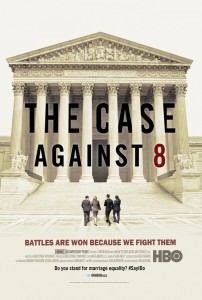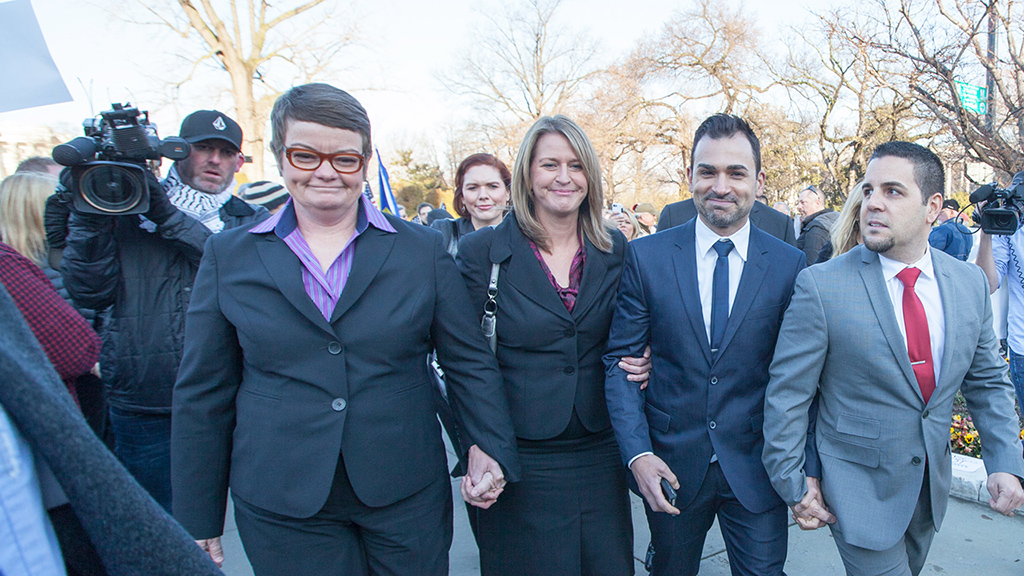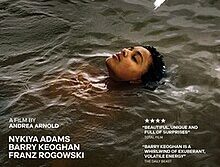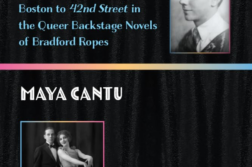 The Case Against 8
The Case Against 8
Directed by Ben Cotner and Ryan White
Moore’s Filmed Goods and Services, Tripod Media
IT HAS BEEN over a year since Prop 8 and DOMA were struck down, and events have been moving rapidly on the marriage equality front as the implications of the Supreme Court’s ruling have rippled across the country in lawsuits at the state and circuit court levels. Documenting the journey from the dark days of Prop 8’s passage in California to the U.S. Supreme Court case are Ben Cotner and Ryan White in a feature-length documentary The Case Against 8, which premiered at the 2014 Sundance Film Festival and aired on HBO on June 23rd.
Tackling the high-profile case from beginning to end, The Case Against 8 follows the lives of two same-sex couples: Kris and Sandy, two middle-aged moms with four sons, and Jeff and Paul, two young men who are waiting to get married before starting a family. After undergoing a rigorous vetting process by the American Foundation for Equal Rights, these four individuals were recruited by AFER to file the lawsuit shortly before the organization brought on renowned attorneys David Boies and Ted Olson to argue it. The four plaintiffs are very sympathetic as individuals, and all are seen as “normal” from a mainstream American
perspective. Thus we visit with Kris and Sandy as they prepare dinner for their family and with Jeff and Paul as they decorate a Christmas tree with Jeff’s parents.
The documentary starts off on an uneasy note, showing the brief period in 2008 when same-sex marriage was legal in California, before Prop 8 was put on the ballot. The film’s subjects are all skeptical about Prop 8’s chance of success, so it comes as quite a shock to them when the referendum passes and their marriages are annulled. That shock, however, soon turns into a long legal battle that culminates in the June 2013 Supreme Court ruling.
As the fight began, much was made about the inclusion of Ted Olson on the case, given his conservative background, especially after his role in Bush v. Gore, when he went up against and defeated David Boies, who argued the Gore case. Olson surprised

everyone by agreeing to team up with Boies, and there was an outcry from both ends of the political spectrum. Conservatives accused him of being a traitor, while liberals suspected that he was a mole planted by the Republicans to sabotage the case. The movie spends a lot of time showing how the plaintiffs prepared their arguments. Boies and Olson put their vast knowledge of Constitutional law to good use, managing to discredit the defense’s witnesses in the Ninth District Court case and even forcing them to admit the error of their position.
One cannot help but view the film through the lens of the actual case and the ultimately favorable outcome for marriage equality. The film does a good job of conveying the tension and anxiety experienced by the people who were involved in the case, taking us step by step to the fateful verdict. Though we know how it will turn out, we’re brought into the nerve-racking journey that the various players went through.
On the other hand, as a work of documentary history, The Case Against 8 doesn’t offer much that we didn’t already know. It tells a good human interest story, and it can undoubtedly help to educate those who are completely in the dark about same-sex equality, but this is definitely a movie that caters more to the heart than to the head.
In addition, the film has been widely criticized for presenting a rather telescoped version of events that largely ignores the legal battles and precedents that had been building up in the years before the Prop 8 case, giving these litigants way too much credit for mounting a case that in fact stood on the shoulders of countless lawyers and organizations. Cotner and White’s film wants to make heroes of Boies and Olson, who seem quite willing to go along for the ride, with the inevitable result that others who played a key role in the struggle (such as Evan Wolfson) are given short shrift. Still, the fact is that this is the case that made it to the Supreme Court, with two of the country’s most prominent lawyers arguing for gay and lesbian rights, which is quite enough to make for an important and often gripping piece of film journalism.
Ziyad Saadi, a contributing writer to Indiewire and The Independent, is a filmmaker based in New York City.





